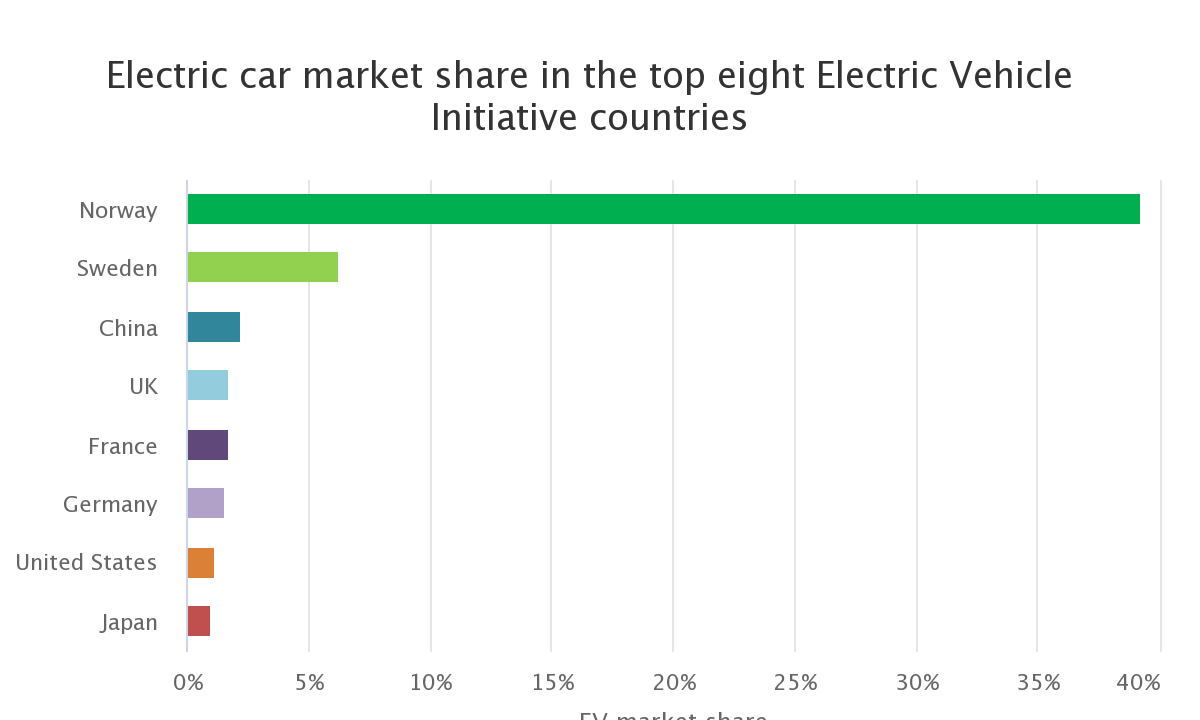Norway’s electric car market has overtaken traditional vehicle sales

Though China still makes up the lion's share of global electric vehicle sales. Image: REUTERS/Ints Kalnins
Sales of electric cars in Norway have overtaken traditional vehicles for the first time: 58% of all new vehicles sold in March 2019 were battery-powered.
When it comes to electric vehicle uptake, Norway is streets ahead of any other country. With a series of incentives introduced by successive governments over the last two decades, it is on a mission to phase out sales of diesel and petrol cars by 2025. In fact, so rapid has the uptake been, that car manufacturers are struggling to keep pace.
The acceleration of the EV market
With countries around the world seeing electric vehicle use as a major way to curb greenhouse gas emissions, incentives to encourage uptake have proliferated.
In Norway, drivers of zero emissions cars (those powered by electric or hydrogen) enjoy benefits such as no road tax, exemption from 25% VAT on sales, reduced road and ferry tolls and parking costs, and access to bus lanes.
These initiatives have propelled Norway to have the highest electric vehicle use per capita.
But, by pure volume, Norway’s EV market is small change in comparison to China. Dwarfing it’s Scandanavian counterpart, it claimed 40% of the EV market in 2017 - up from just over 10% in 2013.
Electric vehicles accounted for 4% of all 28.1 million automobiles sold in China last year - and ambitious targets see the government setting its sights on EVs making up 10% of all passenger car sales in 2019, rising to 12% in 2020.
Still not quick enough?
The future for electric vehicles looks bright and there’s no denying EVs are becoming more affordable and demand is soaring. The global market for electric vehicles has doubled since 2013. However, putting this in context, there are still only 4 million electric vehicles in use around the world, compared to more than a billion cars on the road altogether. And there is still a need for more supporting infrastructure to be developed.
The World Economic Forum’s report Electric Vehicles for Smarter Cities: The Future of Energy and Mobility identifies a number of guiding principles to support and encourage further EV uptake. In particular, the electrification of high-use vehicles, including public transport, should be prioritized. The proliferation of energy-efficient charging hubs and smart charging will also be crucial, with the availability of chargers and the distance cars are able to travel between charges cited by potential EV customers as key concerns.
Don't miss any update on this topic
Create a free account and access your personalized content collection with our latest publications and analyses.
License and Republishing
World Economic Forum articles may be republished in accordance with the Creative Commons Attribution-NonCommercial-NoDerivatives 4.0 International Public License, and in accordance with our Terms of Use.
The views expressed in this article are those of the author alone and not the World Economic Forum.
Stay up to date:
Automotive and New Mobility
Related topics:
The Agenda Weekly
A weekly update of the most important issues driving the global agenda
You can unsubscribe at any time using the link in our emails. For more details, review our privacy policy.
More on Supply Chains and TransportationSee all
Jake Chidester
November 15, 2024










